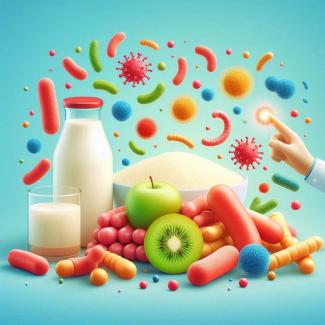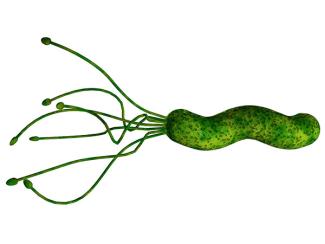
Probiotics and friendly microbes are microorganisms that are beneficial for human health when consumed in adequate amounts. These microorganisms are typically bacteria or yeasts and are known for their positive effects on the human body, particularly on the digestive system and overall well-being. Here's a more detailed understanding of probiotics and friendly microbes:
- Probiotics:
- Definition: Probiotics are live microorganisms that, when consumed in sufficient quantities, provide health benefits to the host (usually humans). They are often called "good" or "friendly" bacteria because of their positive effects on the body.
- Types: The most common types of probiotics are different strains of Lactobacillus and Bifidobacterium bacteria, as well as some yeast strains like Saccharomyces boulardii.
- Sources: Probiotics can be found in various fermented foods and dietary supplements, such as yogurt, kefir, kimchi, sauerkraut, and probiotic capsules or powders.
- Benefits: Probiotics can help maintain a healthy balance of beneficial microorganisms in the gut, improve digestion, support the immune system, and potentially alleviate certain digestive disorders like irritable bowel syndrome (IBS) or diarrhea.
- Friendly Microbes:
- Definition: The term "friendly microbes" is broader than probiotics and encompasses a wider range of microorganisms that have a positive impact on human health. This can include not only probiotics but also other commensal or symbiotic microorganisms.
- Types: In addition to probiotics, friendly microbes include prebiotics (non-digestible food components that support the growth of beneficial microorganisms), commensal bacteria (naturally occurring microorganisms in the body), and symbiotic microorganisms that live in harmony with the human host.
- Sources: Friendly microbes can be found in various foods, the environment, and even within the human body.
- Benefits: Friendly microbes have a more extensive role in supporting human health. They contribute to the breakdown of food, the absorption of nutrients, and play a role in the development and maintenance of the immune system.
The gut microbiota, which consists of trillions of microorganisms, plays a significant role in overall health, from digestion to immunity. Consuming probiotics and supporting friendly microbes through a balanced diet and lifestyle can help maintain a healthy gut microbiome. However, it's essential to note that the benefits and effectiveness of probiotics may vary depending on the specific strain and individual factors.
Before starting a probiotic regimen, it's advisable to consult with a healthcare professional to ensure that you are choosing the right strains and dosages for your specific health needs. Additionally, a balanced diet with a variety of fiber-rich foods can help promote the growth of friendly microbes in your gut.
In which foods are probiotics found?
Probiotics are live microorganisms that can provide health benefits when consumed in adequate amounts. They are commonly found in various foods, especially those that undergo a fermentation process. Some of the foods that are good sources of probiotics include:
- Yogurt: Yogurt is one of the most well-known sources of probiotics, containing strains such as Lactobacillus and Bifidobacterium. Look for yogurts labeled as containing live and active cultures.
- Kefir: Kefir is a fermented dairy product that is similar to yogurt but thinner in consistency. It is rich in a variety of beneficial bacteria and yeasts.
- Sauerkraut: Sauerkraut is fermented cabbage and a good source of probiotics. It typically contains Lactobacillus bacteria.
- Kimchi: Kimchi is a traditional Korean side dish made from fermented vegetables, primarily cabbage and radishes. It contains a variety of lactic acid bacteria.
- Miso: Miso is a traditional Japanese seasoning made by fermenting soybeans with salt and koji (a type of fungus). It contains the probiotic strain Bacillus subtilis.
- Tempeh: Tempeh is a fermented soybean product that originates from Indonesia. It contains a variety of beneficial bacteria and can be used as a meat substitute.
- Pickles (fermented in brine): Some types of pickles are naturally fermented in brine and can be a source of probiotics. Look for pickles that are not pasteurized.
- Traditional buttermilk: Traditional buttermilk is the liquid left behind after churning butter and is fermented with lactic acid bacteria.
- Natto: Natto is a Japanese dish made from fermented soybeans, and it contains the probiotic Bacillus subtilis.
- Some soft cheeses: Certain soft cheeses like Gouda, cheddar, and cottage cheese can contain live cultures of beneficial bacteria.
- Fermented soy products: Products like soy sauce and tamari are made through fermentation and may contain some probiotics, although the bacterial count can be lower than in other fermented foods.
It's essential to check food labels to ensure that the product contains live and active cultures, as heat processing and pasteurization can kill the beneficial bacteria. Additionally, not all probiotics are the same, and different strains may offer various health benefits, so it's a good idea to consume a variety of probiotic-rich foods to support overall gut health.






